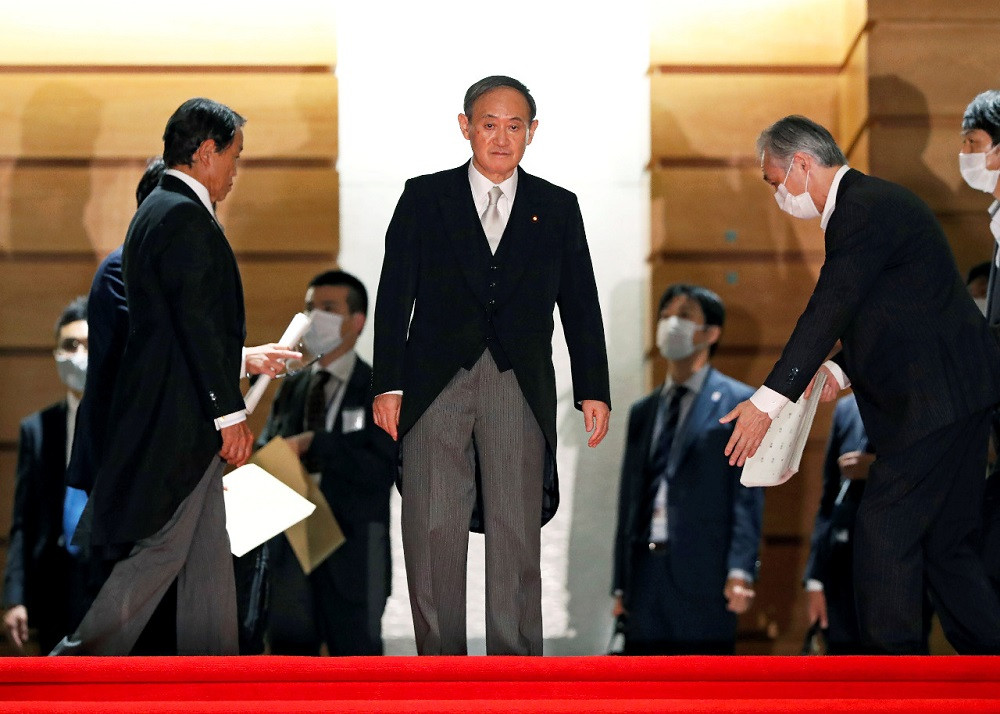Popular Reads
Top Results
Can't find what you're looking for?
View all search resultsPopular Reads
Top Results
Can't find what you're looking for?
View all search resultsIndonesia-Japan relations: Welcoming PM Suga to Indonesia
Japan has an important role in East Asia and the world. Despite demographic challenges and a stagnant economy, Japan is still one of the most enviable among the developed countries.
Change text size
Gift Premium Articles
to Anyone
P
rime Minister Yoshihide Suga’s visit to Vietnam and Indonesia marks an important occasion in Japan’s relations with Southeast Asia. It has been several years since the last visit of a Japanese prime minister — former PM Shinzo Abe has had to shorten or cancel his visit to Jakarta twice, once due to the In Amenas hostage crisis in Algeria and the other time due to a health issue.
Japan has an important role in East Asia and the world. Despite demographic challenges and a stagnant economy, Japan is still one of the most enviable among the developed countries.
Japan is known to be a model for a post-developed country. It has gained success in food security, its infrastructure is one of best in the world, it has enviable domestic security, it possesses advanced technologies based on strong cultural traits, and it has and a political system that is strongly supported by the Japanese people, creating a stable and harmonious society.
PM Suga served as the chief of staff of then PM Abe, with 24 years of experience as a politician. He came from the Yokohama district, which is one of Japan’s busiest ports. He also served in the Department of Commerce. I view him as being more domestic-oriented — as the chief of staff he had the responsibility for a lot of party work and implementation of policies.
Due to the importance of Japan in the world, there are high expectations that PM Suga will focus on Japan’s foreign relations, in particular at the present time when the world is experiencing tough challenges with the pandemic and strained United States-China relations.
While PM Suga has indicated a continuation of Abe’s policies, some changes are in order. With the international order facing challenges posed by strategic rivalry between the US and China, countries in East Asia must do something to make regional rules and institutions as relevant as possible. In this case, Japan as a big economic power and Indonesia as a big country in Southeast Asia have important roles to play.
East Asia and its regional order could become a model for the rest of the world, judging by how countries in the region have fared better than the rest of the world in terms of responding to the pandemic and avoiding massive setback in the economy.
ASEAN continues to promote ASEAN-based regional frameworks/institutions as the center of regional cooperation. The ASEAN+3, or ASEAN plus China, Japan and the Republic of Korea (ROK), could become the best institution to build East Asia’s peace, stability and development in the future.
Thus, the significance of PM Suga’s visit to Jakarta goes far beyond bilateral relations; it also matters to the region and the world.
To support the future of ASEAN+3 cooperation, it is important that Japan, China and the ROK share good relations. PM Suga’s gesture toward the ROK after has was inaugurated as PM has been very welcomed by the region. On the other hand, former PM Abe and Chinese President Xi Jinping had also worked on positive relations, with Xi planning to visit Japan last April, though the visit was postponed due to COVID-19.
I recognize the complexity of the relationship between Japan and China, which is not easy to resolve. There are too many differences, including the values that they hold as the basis for future development. There are issues of the East Asian Sea, and now the South China Sea, Taiwan, North Korea and the relationship with India.
In the past, the Japan-China rivalry was mainly concentrated within the region of East Asia, but now it has spread to other spheres of influence, including Africa, Latin America and the Middle East.
Nonetheless, Japan and China also share economic interdependency, which puts limitations on their rivalry.
Bilateral trade of US$400 billion is no small matter in the relationship. In 2018, then-PM Abe and President Xi agreed to cooperate on investment into Africa, which showed that instead of pure rivalry, there are some forms of cooperation. In the cooperation, the role of the governments is increasing and the public and private partnership have been encouraged.
The role of other states or institutions, including Southeast Asian countries, could help encourage more cooperation between China and Japan. For Southeast Asian countries, both China and Japan are important, in particular in terms of their support for the ASEAN-based regional frameworks, such as the ASEAN Regional Forum, ASEAN Defense Ministerial Meeting+ and East Asian Summit. Besides the leadership and unity of ASEAN, good relations between China and Japan are critical for cooperation in East Asia.
So, welcome Prime Minister Suga! Your timing of the visit is perfect, and Indonesia looks forward to increasing our bilateral relations, and also to your policies and leadership in East Asia, together with China and the ROK, in the context of the ASEAN+3. ASEAN, with support of the three North Eastern countries, could play a central role as in the future development of East Asia as the stimulus needed for global development.
----------
Vice chair, board of trustees, CSIS Foundation










